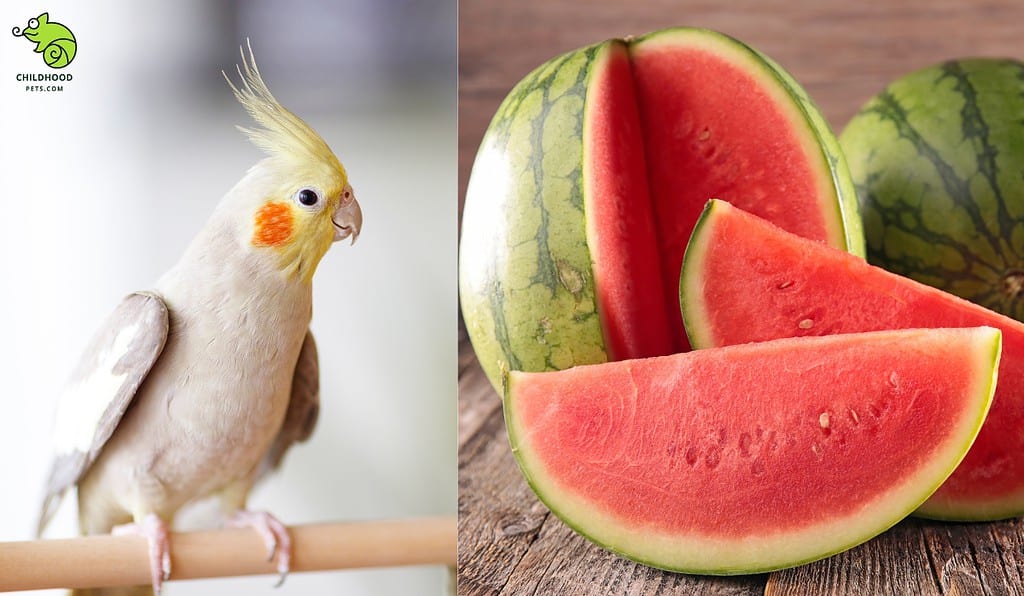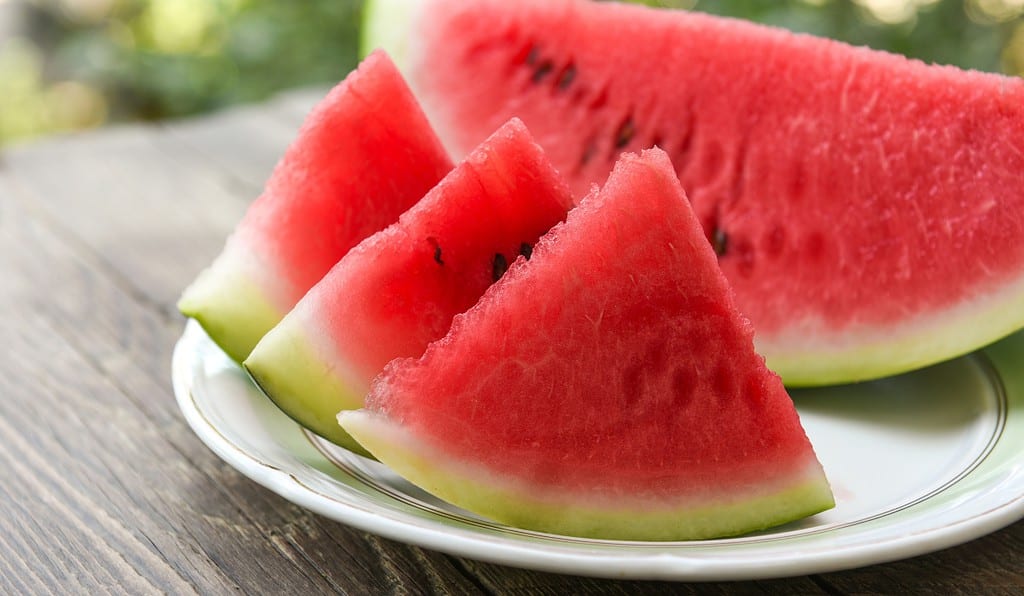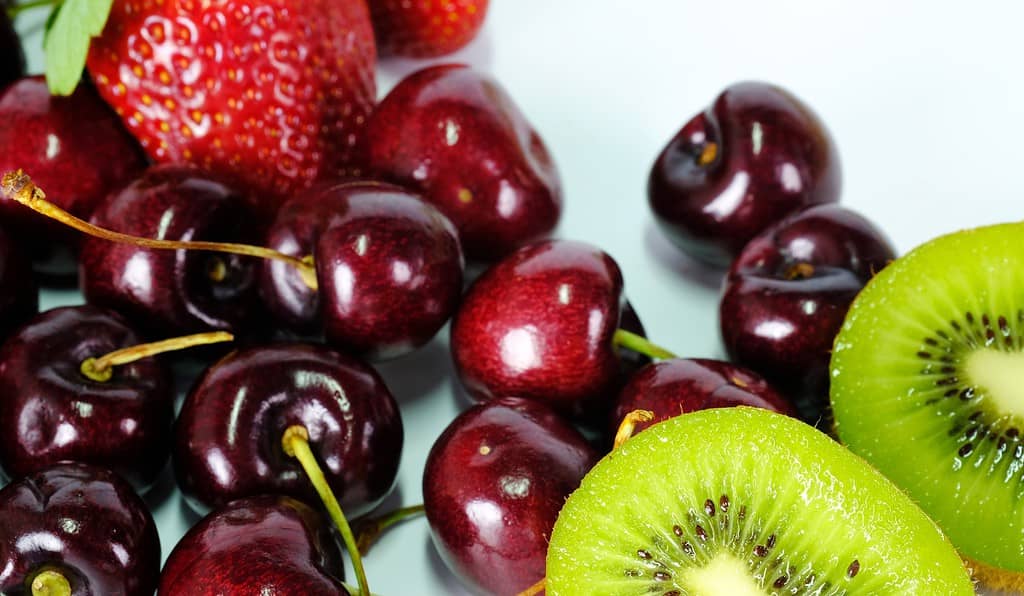
Have you ever found yourself lounging on a sunny day, relishing a juicy slice of watermelon, and wondered if your feathery friend could join in on the fun? Cockatiels, with their vibrant personalities and curious nature, often have us pondering about the variety of treats they can safely enjoy.
As a general rule, cockatiels can indeed savor the refreshing taste of watermelon, making it a delightful treat, especially during those sweltering summer days. This hydrating fruit not only offers a burst of sweetness but also packs in essential nutrients beneficial for our winged companions.
Curious about the specifics? Dive in as we explore the world of cockatiels and watermelons, ensuring you’re equipped with all the knowledge to treat your bird right!
🍉 Did You Know? Watermelon is made up of about 91% water, making it one of the most hydrating fruits available.
Can Cockatiels Eat Watermelon?
The short and sweet answer is: absolutely! Your pet cockatiel can indeed enjoy the refreshing taste of watermelon. Packed with vital vitamins and minerals, watermelon can be a delightful treat for them, especially during those sweltering summer days. But, as with anything, moderation is key.
🍉 Tip: Always ensure the watermelon is fresh and free from any chemicals or pesticides before offering it to your cockatiel.
Watermelon is primarily made up of water, about 91% to be precise. This high water content can be a blessing for your bird, helping them stay hydrated. But there’s more to this fruit than just water. It also contains around 7.5% carbohydrates, a smidge of sugar, and minimal fat and protein. All of these components can be beneficial for your cockatiel when offered in the right amounts.
Now, let’s get a bit technical and delve into the nitty-gritty of what makes watermelon a nutritious choice for your bird.
The Nutritional Value of Watermelon
Watermelon is a hydrating fruit, with water making up a whopping 91% of its content. But that’s not all. It also contains carbohydrates (around 7.5%), a bit of sugar (6.2 g per 100 grams), and negligible amounts of fat and protein.
Essential Vitamins and Minerals Beneficial for Cockatiels:
| Vitamin/Mineral | Benefit for Cockatiels |
| Vitamin C | Boosts the immune system, producing antibodies and even supporting mental health. |
| Potassium | Vital for maintaining a strong cardiovascular and central nervous system. |
| Copper | Essential for bone health and a robust nervous system. |
| Vitamin B5 | Supports the eyes and digestive tract. |
| Vitamin A | Crucial for maintaining healthy feathers and vision. |
So, the next time you’re enjoying a slice of watermelon, remember that your cockatiel can join in on the fun too! But, as with all things, there’s a right way to serve this treat. Let’s explore that next.
Preparing Watermelon for Your Cockatiel
When it comes to serving watermelon to your cockatiel, there are a few things to keep in mind. First and foremost, always opt for organic watermelons. These are free from harmful pesticides that could adversely affect your bird. Remember, while the rind of a watermelon isn’t toxic for cockatiels, it can carry parasites and pesticides. So, it’s a good practice to thoroughly wash the rind, even if you’re not feeding it to your bird.
🍉 Fact: Watermelon seeds aren’t toxic to cockatiels, but they can be a choking hazard, especially for smaller birds.
Now, let’s get into the specifics of how to prepare this juicy treat:
- Wash the Watermelon: Always start by washing the outer surface of the watermelon to remove any dirt or contaminants.
- Slice It Up: Using a sharp knife, cut a slice of watermelon.
- Remove the Rind: While the rind isn’t toxic, it’s best to remove it to avoid any potential risks associated with pesticides or parasites.
- Deseed: Although watermelon seeds aren’t toxic to cockatiels, they can be a choking hazard, especially for smaller birds. So, it’s a good idea to remove them. If you wish, you can soak the seeds in water for a few hours to soften them and then offer them to your bird.
- Cut into Small Pieces: Dice the watermelon flesh into small, manageable pieces that your cockatiel can easily consume.
- Serve Fresh: Offer the freshly cut watermelon pieces to your bird. If they don’t consume it within a couple of hours, it’s best to remove any leftovers to prevent spoilage.
How Often and How Much?
Variety is the spice of life, and the same goes for your cockatiel’s diet. While watermelon is a nutritious treat, it shouldn’t replace all other fruits in their diet. As a rule of thumb, fruits and veggies should make up about 20-25% of their daily caloric intake. Specifically, for watermelon, it’s best to offer a thin slice once a week. This ensures they get the benefits without overindulging.
🍉 Did You Know? Watermelon is made up of about 91% water, making it one of the most hydrating fruits available.
Dos and Don’ts of Feeding Watermelon to Cockatiels:
- Do offer watermelon as a treat, not a staple.
- Do ensure the watermelon is fresh and free from mold or spoilage.
- Don’t feed your cockatiel too much watermelon; moderation is key.
- Don’t offer watermelon with the rind unless you’re certain it’s free from pesticides and has been thoroughly washed.
- Do observe your bird after introducing any new food to ensure there are no adverse reactions.
Remember, every bird is unique. While most cockatiels will relish the sweet taste of watermelon, some might be indifferent. It’s all about understanding your bird’s preferences and ensuring their diet is balanced and nutritious.
Potential Risks and Precautions
While watermelon is a delightful treat for cockatiels, there are certain parts of the fruit that require a bit more caution. Let’s talk about the seeds first. Cockatiels can eat watermelon seeds, but there’s a catch. These seeds, although not toxic, can pose a choking hazard, especially if your bird isn’t accustomed to consuming seeds of this size. Many bird owners opt to remove the seeds as a precautionary measure.
🚫 Caution: Always be careful with seeds and rinds when feeding fruits to your cockatiel.
Now, onto the rind. The green shell that encases the juicy goodness of the watermelon might seem harmless, but it often comes coated in pesticides. These pesticides are used to keep the fruit healthy and bug-free while growing. Even if the rind isn’t toxic per se, these chemicals can be harmful to your bird. Always rinse your watermelon thoroughly before serving, and it’s generally a good idea to avoid feeding the rind to your cockatiel.
Risks and Benefits of Feeding Seeds and Rind to Cockatiels:
| Component | Risks | Benefits |
| Seeds | Potential choking hazard; might be hard for some birds to digest. | Natural source of nutrients if bird is accustomed to seeds. |
| Rind | Coated in pesticides; potential for chemical ingestion. | None, best to avoid. |
Overconsumption
Watermelon, with its high water content (around 91%), can be a double-edged sword. While it’s fantastic for hydrating your bird, especially during hot days, too much of it can lead to some “watery” problems. If your cockatiel consumes excessive amounts of watermelon, you might notice their stool becoming more liquid. This isn’t a severe issue, but it’s a sign that you might want to cut back on the watermelon servings.
💧 Hydration Tip: While watermelon is great for hydration, ensure it’s given in moderation to avoid digestive issues.
Signs to Watch for in Case of Overconsumption:
- Watery or unusually soft droppings.
- Reduced appetite for other foods.
- Changes in behavior or energy levels.
Remember, watermelon should be a treat, not a staple. It’s all about balance and moderation. If you ever have concerns about your cockatiel’s diet or notice any adverse reactions, it’s always best to consult with a veterinarian.
Cockatiels’ Reaction to Watermelon

Cockatiels, with their curious nature and vibrant personalities, often have varied reactions to different foods. When it comes to watermelon, most cockatiels absolutely adore it. The sweet, crunchy texture combined with the high water content makes it an irresistible treat for many of these feathered companions.
However, just like humans, every cockatiel is an individual with its own set of preferences. While many might relish the juicy delight of watermelon, some might turn their beaks up at it. It’s essential to remember that it’s perfectly okay if your cockatiel doesn’t take to watermelon. There’s a plethora of other fruits and treats they might enjoy.
🍓 Fun Fact: Apart from watermelon, cockatiels also enjoy fruits like strawberries, blueberries, and kiwi!
Potential Reactions Cockatiels Might Have to Watermelon:
Positive Reactions:
- Eagerly nibbling on the offered piece.
- Vocalizing or chirping more, indicating excitement.
- Actively seeking more after finishing the initial piece.
Neutral or Indifferent Reactions:
- Ignoring the offered watermelon.
- Picking at it but not consuming much.
Negative Reactions:
- Actively avoiding the watermelon.
- Throwing the piece out of their cage or dish.
Every cockatiel is unique; what one loves, another might ignore. If your cockatiel is trying watermelon for the first time, it’s a good idea to observe their reaction. This will give you insights into their likes and dislikes, helping you tailor their diet accordingly. And if they don’t seem to like it, don’t be disheartened. There’s a whole world of fruits out there to explore!
🍍 Tip: Introducing new foods slowly and in small amounts can help gauge your bird’s preference and ensure they don’t have any adverse reactions.
Other Fruits Safe for Cockatiels

Variety is the key to a balanced diet, and this holds true for cockatiels as well. While watermelon is a fantastic treat, it’s essential to introduce your feathered friend to a range of fruits. This ensures they receive a mix of different nutrients essential for their overall well-being.
🍓 Did You Know? Cockatiels have a natural curiosity towards new foods, making it relatively easier to introduce them to a variety of fruits.
Fruits Safe for Cockatiels and Their Benefits:
| Fruit | Benefits | Potential Risks |
| Kiwi | Rich in Vitamin C and antioxidants, it promotes a strong immune system. | Ensure it’s ripe to avoid digestive issues. |
| Papaya | Contains enzymes beneficial for digestion. | None. |
| Grapes | Packed with vitamins and antioxidants. | Feed in moderation due to high sugar content. |
| Apple | Good source of dietary fiber and Vitamin C. | Always remove seeds as they can be toxic. |
| Banana | High in potassium, beneficial for heart health. | Feed in moderation due to sugar content. |
| Cherries | Rich in antioxidants and Vitamin C. | Remove pits before feeding. |
| Oranges | High in Vitamin C, boosting the immune system. | Avoid feeding too much due to acidity. |
It’s worth noting that while most fruits are safe for cockatiels, always ensure they’re fresh and free from mold or spoilage. Also, always introduce new fruits in small amounts and observe your bird’s reaction. This way, you can quickly identify any allergies or intolerances.
🐦 Expert Advice: Always observe your bird after introducing a new food. This helps in identifying any allergies or intolerances early on.
Final Thoughts
As a veterinarian, I’ve seen countless bird owners eager to provide the best for their pets. And I can’t stress enough the importance of a balanced diet. Watermelon, with its hydrating properties and rich nutrient profile, is undoubtedly a great addition to your cockatiel’s diet. However, like all things, moderation is key. Pair it with a variety of other fruits, and you’re on your way to ensuring your cockatiel leads a healthy, happy life.
I’d love to hear about your experiences. Have you tried feeding your cockatiel watermelon? How did they react? Share your stories in the comments below!
Frequently Asked Questions
How much fruit should be in a cockatiel’s diet?
Fruits should make up about 20-25% of a cockatiel’s daily caloric intake.
Are watermelon rinds healthy for cockatiels?
While not toxic, watermelon rinds may contain pesticides; it’s best to avoid or ensure they’re thoroughly cleaned.
Can birds eat watermelon?
Yes, many birds, including cockatiels, can safely enjoy watermelon.
What other fruits can cockatiels eat?
Cockatiels can eat berries, melons, kiwi, and various other fruits, provided they are fresh and free from chemicals.
